The Role of Knowledge, Information, and Data in Business Systems
VerifiedAdded on 2023/06/11
|5
|805
|391
Essay
AI Summary
This essay defines and differentiates between knowledge, information, and data within the context of business information systems. It emphasizes the importance of accuracy in information for organizations like PPX and explains how data is transformed into useful information. The essay also explores different types of knowledge, including explicit, tacit, and propositional knowledge, highlighting their significance in organizational understanding and operations. The document is contributed by a student and available on Desklib, a platform offering AI-based study tools and resources for students.
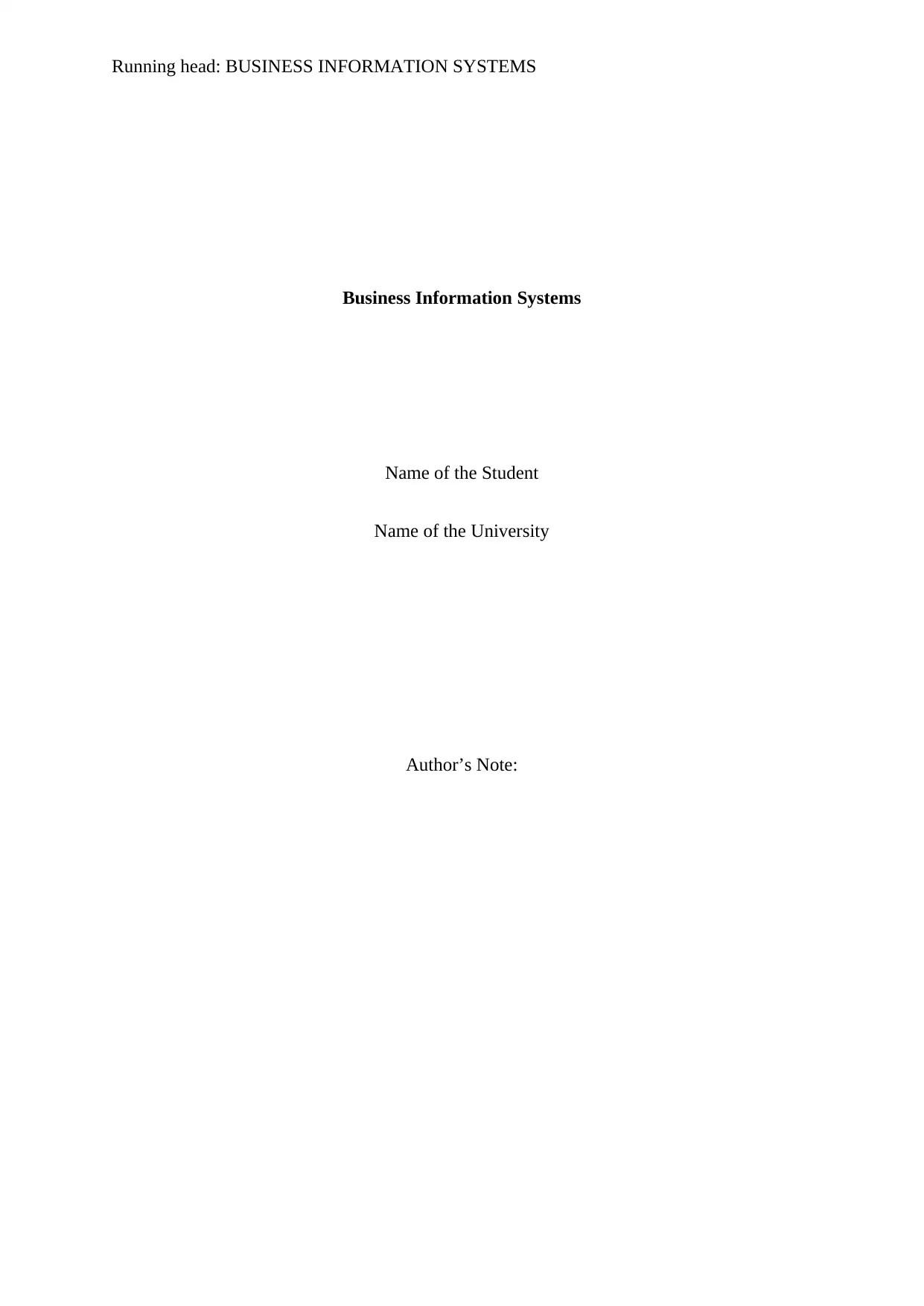
Running head: BUSINESS INFORMATION SYSTEMS
Business Information Systems
Name of the Student
Name of the University
Author’s Note:
Business Information Systems
Name of the Student
Name of the University
Author’s Note:
Paraphrase This Document
Need a fresh take? Get an instant paraphrase of this document with our AI Paraphraser
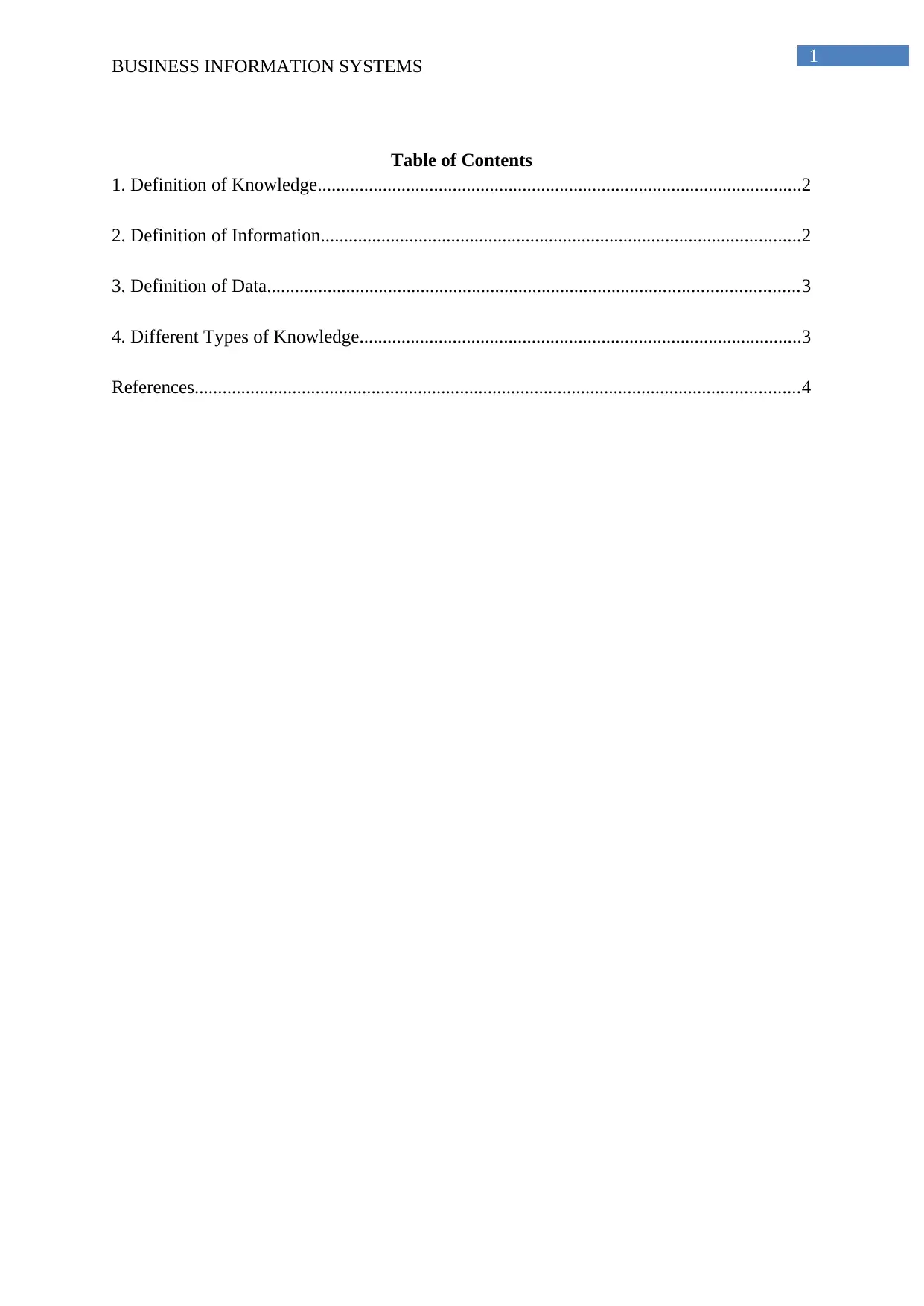
1
BUSINESS INFORMATION SYSTEMS
Table of Contents
1. Definition of Knowledge........................................................................................................2
2. Definition of Information.......................................................................................................2
3. Definition of Data..................................................................................................................3
4. Different Types of Knowledge...............................................................................................3
References..................................................................................................................................4
BUSINESS INFORMATION SYSTEMS
Table of Contents
1. Definition of Knowledge........................................................................................................2
2. Definition of Information.......................................................................................................2
3. Definition of Data..................................................................................................................3
4. Different Types of Knowledge...............................................................................................3
References..................................................................................................................................4
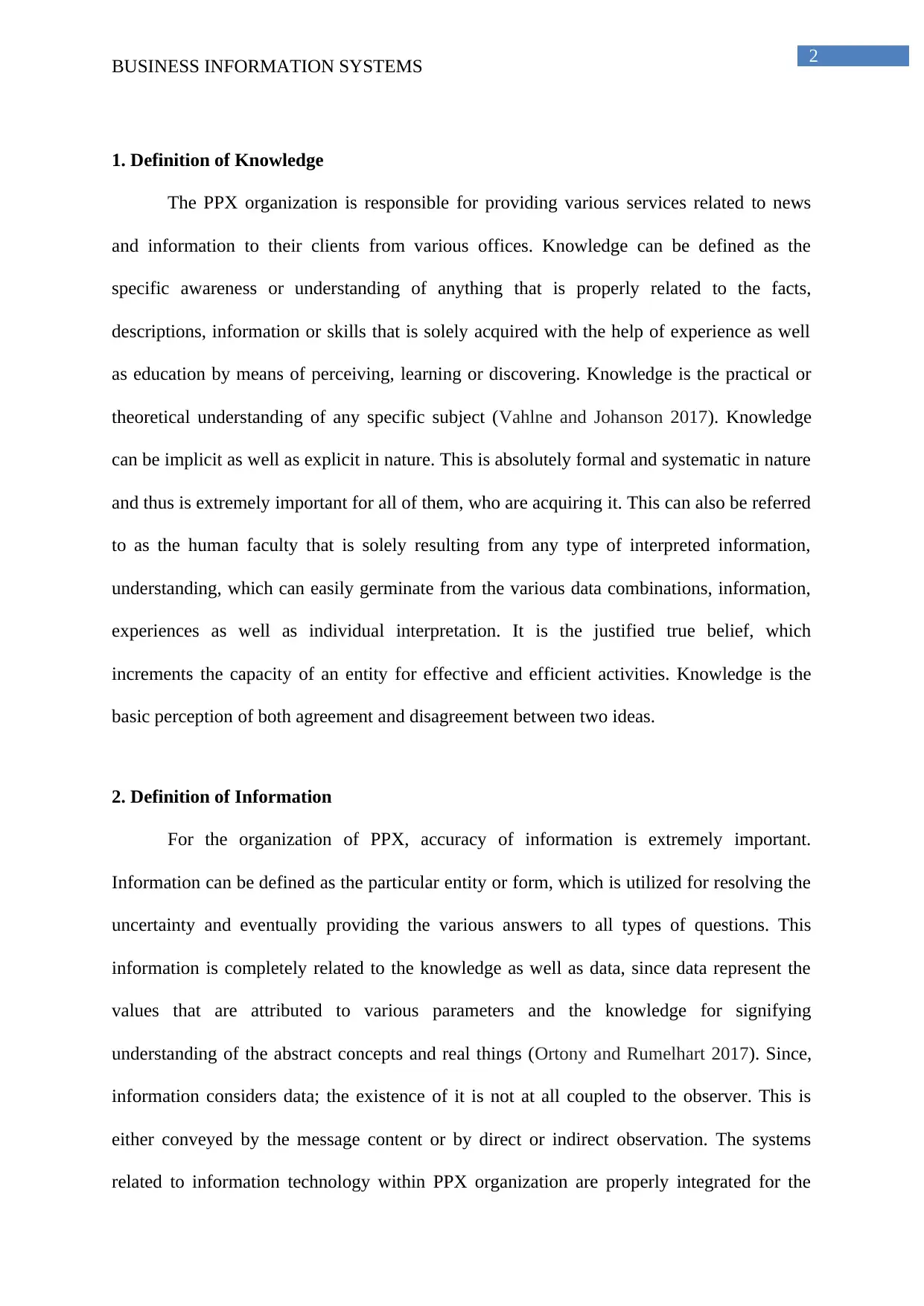
2
BUSINESS INFORMATION SYSTEMS
1. Definition of Knowledge
The PPX organization is responsible for providing various services related to news
and information to their clients from various offices. Knowledge can be defined as the
specific awareness or understanding of anything that is properly related to the facts,
descriptions, information or skills that is solely acquired with the help of experience as well
as education by means of perceiving, learning or discovering. Knowledge is the practical or
theoretical understanding of any specific subject (Vahlne and Johanson 2017). Knowledge
can be implicit as well as explicit in nature. This is absolutely formal and systematic in nature
and thus is extremely important for all of them, who are acquiring it. This can also be referred
to as the human faculty that is solely resulting from any type of interpreted information,
understanding, which can easily germinate from the various data combinations, information,
experiences as well as individual interpretation. It is the justified true belief, which
increments the capacity of an entity for effective and efficient activities. Knowledge is the
basic perception of both agreement and disagreement between two ideas.
2. Definition of Information
For the organization of PPX, accuracy of information is extremely important.
Information can be defined as the particular entity or form, which is utilized for resolving the
uncertainty and eventually providing the various answers to all types of questions. This
information is completely related to the knowledge as well as data, since data represent the
values that are attributed to various parameters and the knowledge for signifying
understanding of the abstract concepts and real things (Ortony and Rumelhart 2017). Since,
information considers data; the existence of it is not at all coupled to the observer. This is
either conveyed by the message content or by direct or indirect observation. The systems
related to information technology within PPX organization are properly integrated for the
BUSINESS INFORMATION SYSTEMS
1. Definition of Knowledge
The PPX organization is responsible for providing various services related to news
and information to their clients from various offices. Knowledge can be defined as the
specific awareness or understanding of anything that is properly related to the facts,
descriptions, information or skills that is solely acquired with the help of experience as well
as education by means of perceiving, learning or discovering. Knowledge is the practical or
theoretical understanding of any specific subject (Vahlne and Johanson 2017). Knowledge
can be implicit as well as explicit in nature. This is absolutely formal and systematic in nature
and thus is extremely important for all of them, who are acquiring it. This can also be referred
to as the human faculty that is solely resulting from any type of interpreted information,
understanding, which can easily germinate from the various data combinations, information,
experiences as well as individual interpretation. It is the justified true belief, which
increments the capacity of an entity for effective and efficient activities. Knowledge is the
basic perception of both agreement and disagreement between two ideas.
2. Definition of Information
For the organization of PPX, accuracy of information is extremely important.
Information can be defined as the particular entity or form, which is utilized for resolving the
uncertainty and eventually providing the various answers to all types of questions. This
information is completely related to the knowledge as well as data, since data represent the
values that are attributed to various parameters and the knowledge for signifying
understanding of the abstract concepts and real things (Ortony and Rumelhart 2017). Since,
information considers data; the existence of it is not at all coupled to the observer. This is
either conveyed by the message content or by direct or indirect observation. The systems
related to information technology within PPX organization are properly integrated for the
⊘ This is a preview!⊘
Do you want full access?
Subscribe today to unlock all pages.

Trusted by 1+ million students worldwide
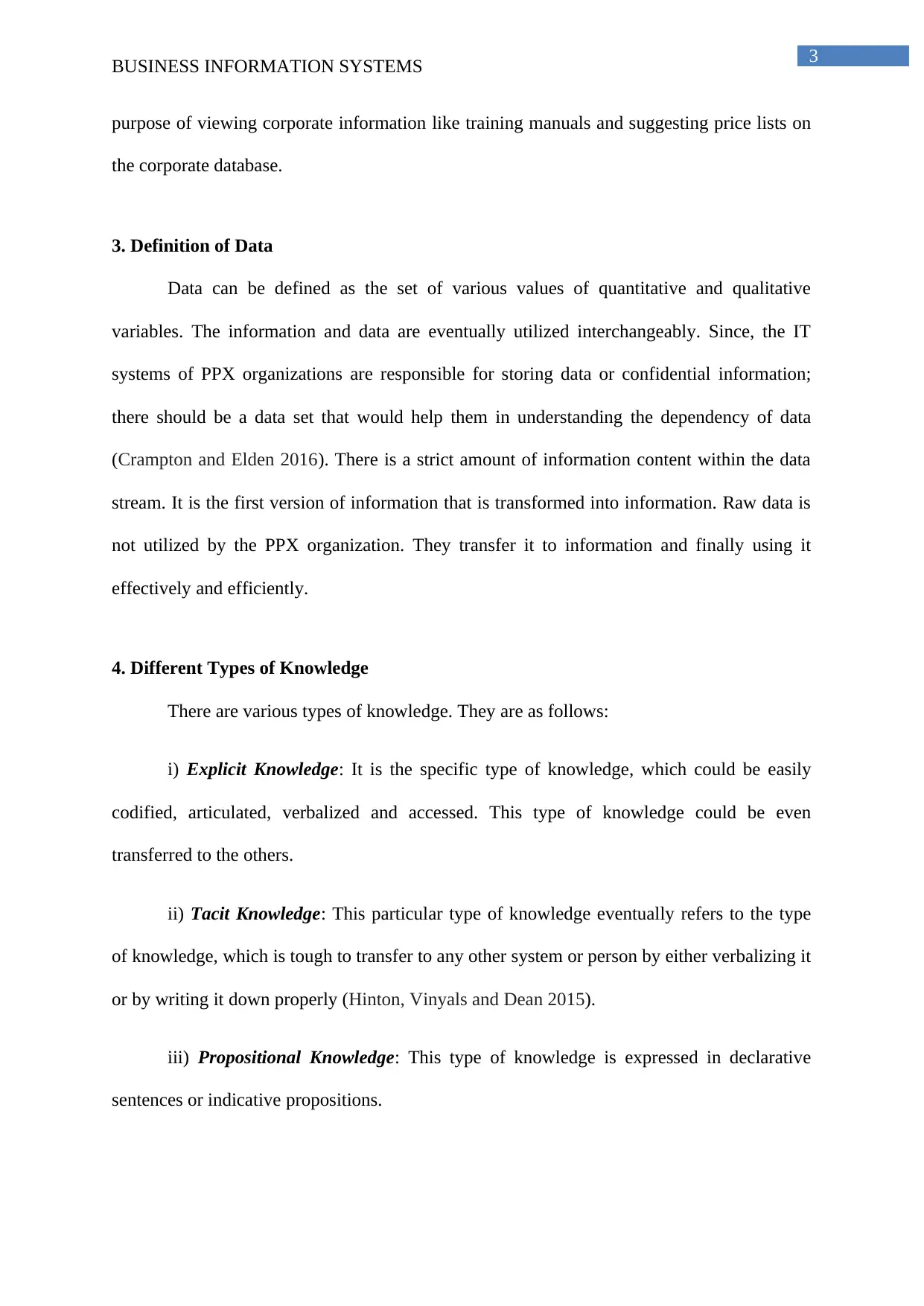
3
BUSINESS INFORMATION SYSTEMS
purpose of viewing corporate information like training manuals and suggesting price lists on
the corporate database.
3. Definition of Data
Data can be defined as the set of various values of quantitative and qualitative
variables. The information and data are eventually utilized interchangeably. Since, the IT
systems of PPX organizations are responsible for storing data or confidential information;
there should be a data set that would help them in understanding the dependency of data
(Crampton and Elden 2016). There is a strict amount of information content within the data
stream. It is the first version of information that is transformed into information. Raw data is
not utilized by the PPX organization. They transfer it to information and finally using it
effectively and efficiently.
4. Different Types of Knowledge
There are various types of knowledge. They are as follows:
i) Explicit Knowledge: It is the specific type of knowledge, which could be easily
codified, articulated, verbalized and accessed. This type of knowledge could be even
transferred to the others.
ii) Tacit Knowledge: This particular type of knowledge eventually refers to the type
of knowledge, which is tough to transfer to any other system or person by either verbalizing it
or by writing it down properly (Hinton, Vinyals and Dean 2015).
iii) Propositional Knowledge: This type of knowledge is expressed in declarative
sentences or indicative propositions.
BUSINESS INFORMATION SYSTEMS
purpose of viewing corporate information like training manuals and suggesting price lists on
the corporate database.
3. Definition of Data
Data can be defined as the set of various values of quantitative and qualitative
variables. The information and data are eventually utilized interchangeably. Since, the IT
systems of PPX organizations are responsible for storing data or confidential information;
there should be a data set that would help them in understanding the dependency of data
(Crampton and Elden 2016). There is a strict amount of information content within the data
stream. It is the first version of information that is transformed into information. Raw data is
not utilized by the PPX organization. They transfer it to information and finally using it
effectively and efficiently.
4. Different Types of Knowledge
There are various types of knowledge. They are as follows:
i) Explicit Knowledge: It is the specific type of knowledge, which could be easily
codified, articulated, verbalized and accessed. This type of knowledge could be even
transferred to the others.
ii) Tacit Knowledge: This particular type of knowledge eventually refers to the type
of knowledge, which is tough to transfer to any other system or person by either verbalizing it
or by writing it down properly (Hinton, Vinyals and Dean 2015).
iii) Propositional Knowledge: This type of knowledge is expressed in declarative
sentences or indicative propositions.
Paraphrase This Document
Need a fresh take? Get an instant paraphrase of this document with our AI Paraphraser
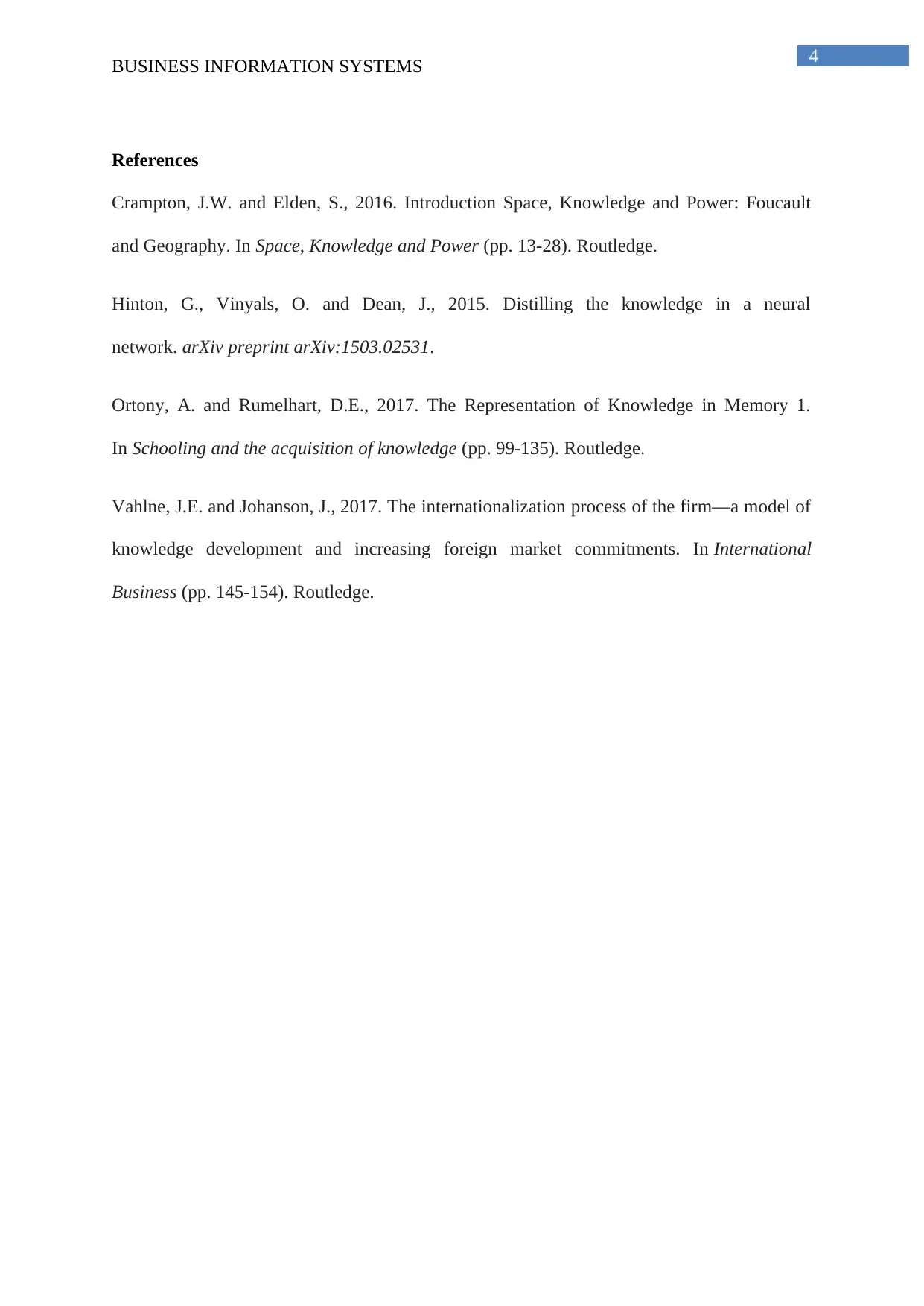
4
BUSINESS INFORMATION SYSTEMS
References
Crampton, J.W. and Elden, S., 2016. Introduction Space, Knowledge and Power: Foucault
and Geography. In Space, Knowledge and Power (pp. 13-28). Routledge.
Hinton, G., Vinyals, O. and Dean, J., 2015. Distilling the knowledge in a neural
network. arXiv preprint arXiv:1503.02531.
Ortony, A. and Rumelhart, D.E., 2017. The Representation of Knowledge in Memory 1.
In Schooling and the acquisition of knowledge (pp. 99-135). Routledge.
Vahlne, J.E. and Johanson, J., 2017. The internationalization process of the firm—a model of
knowledge development and increasing foreign market commitments. In International
Business (pp. 145-154). Routledge.
BUSINESS INFORMATION SYSTEMS
References
Crampton, J.W. and Elden, S., 2016. Introduction Space, Knowledge and Power: Foucault
and Geography. In Space, Knowledge and Power (pp. 13-28). Routledge.
Hinton, G., Vinyals, O. and Dean, J., 2015. Distilling the knowledge in a neural
network. arXiv preprint arXiv:1503.02531.
Ortony, A. and Rumelhart, D.E., 2017. The Representation of Knowledge in Memory 1.
In Schooling and the acquisition of knowledge (pp. 99-135). Routledge.
Vahlne, J.E. and Johanson, J., 2017. The internationalization process of the firm—a model of
knowledge development and increasing foreign market commitments. In International
Business (pp. 145-154). Routledge.
1 out of 5
Related Documents
Your All-in-One AI-Powered Toolkit for Academic Success.
+13062052269
info@desklib.com
Available 24*7 on WhatsApp / Email
![[object Object]](/_next/static/media/star-bottom.7253800d.svg)
Unlock your academic potential
Copyright © 2020–2026 A2Z Services. All Rights Reserved. Developed and managed by ZUCOL.




